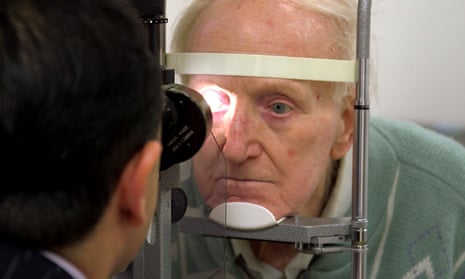Patients in England are having to wait up to 15 months to have cataracts removed from their eyes amid increasing rationing linked to the NHS’s deepening financial woes, a new report has revealed.
People in the north London borough of Enfield face the longest wait – 467 days – between being referred for cataract surgery and actually having it, according to research by the charity RNIB published on Wednesday.
That is more than double the longest delay – 222 days – the RNIB found when it first examined waiting times for the procedure in England in 2013. That occured in Heywood, Middleton and Rochdale in greater Manchester
Other areas with notably long waits include those covered by the GP-led NHS clinical commissioning group (CCG) in Swindon (180 days), Havering in Essex (176 days) and Southampton (174 days).
Long delays caused by the NHS’s drive for “efficiency savings” are causing misery for the mainly elderly patients troubled with cataracts, the RNIB claimed.
“Waiting times for cataract operations are getting worse in some areas of England, such as Enfield and Swindon. Cost-cutting measures are forcing CCGs to restrict access to cataract treatment, leaving patients struggling to cope with daily life,” said Holly Heath, RNIB eye health policy and campaigns officer.
“Shockingly, the longest average waiting time for cataract treatment has more than doubled in the last three years. This is unacceptable and decisions about access to treatment must always be based on clinical need and in the best interests of patients,” she added.
By contrast, Luton CCG treated patients the quickest, within 15 days on average. Wolverhampton (19 days), north Norfolk and Sheffield (both 20 days) and Hastings and Rother in Kent (21) were the next fastest for giving patients the procedure.
The NHS undertakes more cataract removals per year than any other surgical procedure – 395,661 in 2015-16. The number of operations has been going up in recent years to try to keep pace with growing demand linked to the ageing population. Surgery usually helps patients to see much better and to be able to work and drive a car.
The RNIB’s report said: “Patients regularly tell us that they are being denied surgery despite it having a major impact on their quality of life. We are aware of many patients who desperately need this life-changing surgery but are unable to access it.”
Making patients wait is “a false economy” because delay increases the risk of depression, social isolation and hip fracture, the report said. “Treating mental health conditions and repairing hip fractures are substantially more costly to the NHS and social care services than cataract.”
NHS England said that most patients were treated within the 18 weeks guaranteed under the NHS constitution.
“Over the last decade, there has been considerable investment to improve access to cataract surgery. In the 1990s patients were waiting a year or more for cataract surgery. By 2010 approximately 90% of patients were seen within 18 weeks,” said David Geddes, NHS England national head of primary care commissioning.
The report comes as the Royal College of Physicians (RCP) has warned that the NHS has reached “a point of no return” as a result of underfunding and staff shortages and could be about to collapse.
“NHS staff increasingly feel like collateral damage in the battle between rising demand and squeezed budgets,” the RCP, which represents hospital doctors in England, said in a new report.
Andrew Goddard, the RCP’s registrar, said: “It is clear to all of us working in the NHS that we are at a point of no return and the NHS in its current form is unsustainable without a significant increase in funding.
“We can’t continue to provide ever-more-expensive treatments to an ever-increasing group of patients and not expect the system to collapse.”
The RCP report, Underfunded, Underdoctored, Overstretched, into the state of the NHS points out that while demand for care is going up 4% a year, the health service’s budget is due to rise by only 0.2% annually between now and 2020.
The chancellor, Philip Hammond, is under pressure to find extra money for the NHS in his autumn statement on 23 November.
Four in five trainee hospital doctors say their job causes them excessive stress, while 95% say that poor staff morale is affecting the safety of patient care.










Comments (…)
Sign in or create your Guardian account to join the discussion